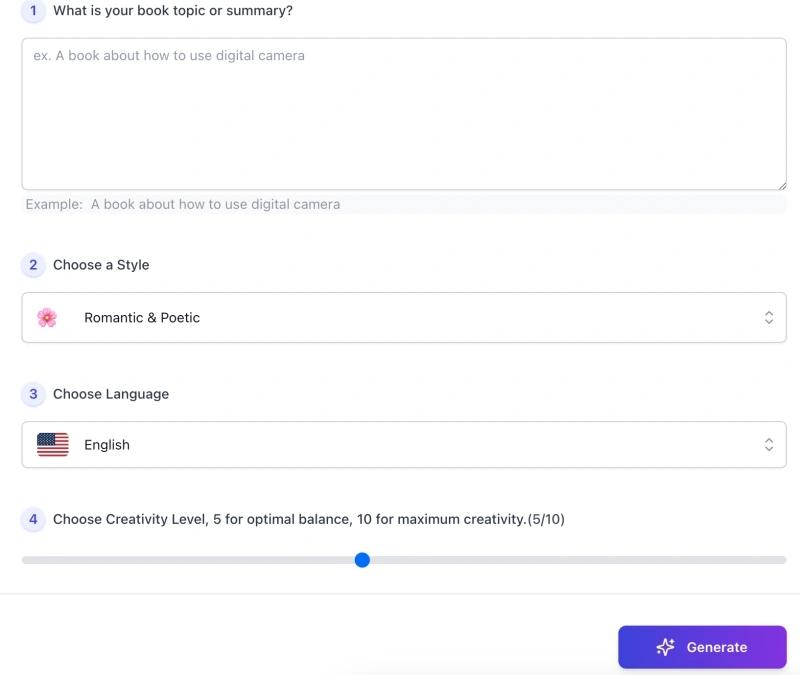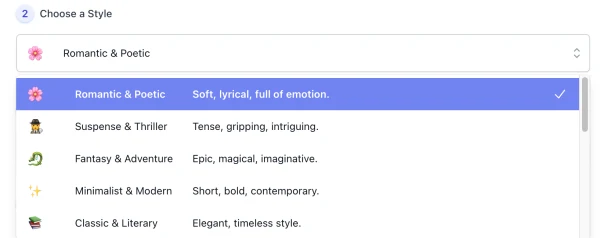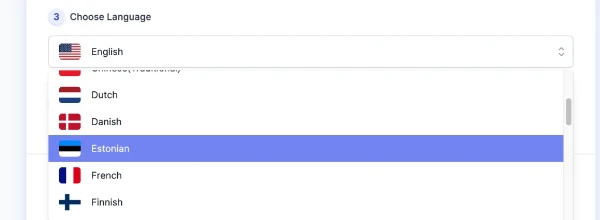Free AI Tools. No Sign-Up Required. Full Access.
AI Book Title Generator
Free AI tool to create book titles online — no sign-up, perfect for authors, editors, and publishers.
Combine the current tool with these other tools to work more efficiently.
Discover other tools with functions and purposes similar to the one you are currently viewing.
Discover the tools most favored and highly-rated by users on our website.
Explore more AI tools in these related categories
AI tools for generating, and assisting with story and book writing tasks.
AI tools that automatically create text content for your images, audio, or video from user prompts.
AI tools that automatically generate names for businesses, products, brands, or creative projects.
This is AIFreeBox AI Book Title Generator page – an online, style-driven tool for authors, publishers, independent writers, and creative professionals — helping create audience-focused, market-ready, and memorable book titles across genres and markets, serving as a foundation for inspiration.
On this page, you’ll find its core capabilities, where it works best, step-by-step usage, creative tips, known limitations with solutions, and a detailed FAQ — all focused on helping you create style-specific book titles that fit your content, engage your audience, and inspire new ideas. Available on free and ultra plans.
What Can AIFreeBox AI Book Title Generator Do?
Powered by transformer-based large language models fine-tuned for creative naming, this tool blends AI precision with human insight. You provide the book’s topic and chosen style, and it delivers valuable, style-specific title ideas — serving as inspiration to guide your own creative decisions.
Designed around a human–AI collaboration model, it ensures that the AI’s output complements your vision rather than replaces it.
The system supports 33 languages and 20 composite style types, making it adaptable across genres, cultures, and markets. Its strength lies in generating titles that not only match your content but also connect with readers, turning inspiration into results.
AIFreeBox Book Title Generator vs “Random Name Generator”
| Dimension | AI Book Title Generator | “Random Name Generator” |
|---|---|---|
| Content Quality | Style-specific titles that fit the audience, highlight key selling points, and are easy to remember | Generic, context-free names with mixed quality |
| Value | Delivers audience-focused, market-ready inspiration | Offers random suggestions with little strategic value |
| Human–AI Collaboration | Provides multiple options with creative reasoning; you refine based on market research, personal taste, and legal checks | One-click output with no creative process |
| Usability of Output | Often close to publish-ready, serving as a strong foundation for your final title | Often requires full rewriting or heavy edits |
Why We Recommend It — Who, When, and Why
| For Who | Use Case | Problem It Solves |
|---|---|---|
| First-time authors | Naming a debut novel | Struggle to find a title that feels unique and market-ready |
| Series creators | Titling sequels or multi-book series | Inconsistent naming style across volumes |
| Genre switchers | Rebranding for a new genre | Existing title tone doesn’t match new audience expectations |
| Non-fiction & business writers | Positioning expertise or value | Title fails to highlight benefits or credibility |
| Children’s book authors | Creating playful, age-friendly titles | Language not engaging or suitable for young readers |
| Global publishers | Launching in multiple markets | Direct translations lose cultural and emotional impact |
How to Write a Book Title With AIFreeBox AI:
Step-by-Step Guide

Step 1 — Enter Your Book Topic or Summary
Type a clear, 1–3 sentence summary of your book. Keep facts accurate and focused on the core premise.
Example: A practical guide that teaches beginners how to use a digital camera.
Step 2 — Choose a Style

Select one of the 14 style options (e.g., Romantic & Poetic, Suspense & Thriller). Pick the style that best matches your genre, tone, and target readers.
Step 3 — Choose Language

Select the language for your titles. Use the language of your primary market or the audience you plan to target.
Step 4 — Set Creativity Level
Use the slider to control variation: lower for tighter, on-topic options; higher for bolder, more surprising ideas. (5 is a balanced default.)
Step 5 — Generate
Click Generate. You’ll get a numbered list of concise title ideas. Review for fit with your topic and audience; regenerate if needed by adjusting style or creativity.
Step 6 — Copy or Download
Use Copy to save selected titles to your clipboard, or Download to keep the full list for later review and team feedback.
Step 7 — Report Bug (We’re here to help)

If something looks off, click Report Bug. A real support member will review your case. Please include: your topic text, chosen style, language, creativity level, and a brief description or screenshot (e.g., repeated titles, wrong language, formatting issues, download problems). We read every report and use it to improve the tool.
Reminder: Use these titles as a starting point. Verify audience fit, check for duplicate/trademark conflicts, and refine based on your goals before finalizing.
Tips to Generate the Best Book Titles
- Be clear in your topic summary: Include the main theme, genre, and key elements in 1–3 sentences for the AI to work with.
- Match style to your audience: Choose a style that fits your readers’ expectations and the book’s tone.
- Use strong keywords: Add unique or evocative words that highlight your book’s hook or selling point.
- Balance creativity and clarity: High creativity may give surprising ideas; lower settings give more precise, on-topic results.
- Review multiple options: Compare and refine, mixing elements from different titles if needed.
- Check relevance and originality: Make sure the final choice aligns with your content and is free of trademark conflicts.
These tips work best when combined with the steps in the “How to Use” section — helping you go from knowing how to use the tool to getting the most relevant and reader-focused results.
User Case Study — How AI + You Create the Perfect Title
1. User Input
Topic: A love story between a painter and a pianist in Paris, exploring art, passion, and destiny.
Style: 🌸 Romantic & Poetic
Language: English
Creativity Level: 6/10
Why this works: The topic is concise yet detailed, giving the AI enough context to match style and tone.
2. AI Output
- Whispers in the Paris Rain
- Canvas of the Heart
- Melody Between Brushstrokes
- The Palette of Love
- When Music Paints the Sky
AI’s role: Provide multiple, style-specific title options that fit the romantic and poetic mood.
3. User Refinement
The user prefers Melody Between Brushstrokes for its balance of music and painting imagery. They test it against Canvas of the Heart in reader polls and check for uniqueness in book title databases.
Why refine: Even strong AI suggestions benefit from human judgment on market fit, originality, and emotional resonance.
4. Final Title
Melody Between Brushstrokes — chosen for its evocative imagery, clear link to the plot, and easy recall.
Key Takeaways
- Provide a rich but focused topic description.
- Match style to audience expectations.
- Use AI options as a starting point, not the final word.
- Check for originality, relevance, and reader appeal before finalizing.
- AI gives multiple candidates with creative reasoning, and the final choice should be made by combining market research, personal taste, and legal risk checks.
This example shows the human–AI collaboration model in action — AI delivers inspiration, and you make the final creative and strategic choices to ensure the title truly serves your readers.
Styles System Overview
Choose one style to guide tone, wording, and reader appeal.
- 🌸 Romantic & Poetic: Soft, lyrical, full of emotion — best for romance and dramatic love stories.
- 🕵️ Suspense & Thriller: Tense, gripping, intriguing — best for crime, suspense, and psychological thrillers.
- 🐉 Fantasy & Adventure: Epic, magical, imaginative — best for high fantasy, quests, and epic sagas.
- ✨ Minimalist & Modern: Short, bold, contemporary — best for modern fiction and design-forward covers.
- 📚 Classic & Literary: Elegant, timeless style — best for literary fiction and historical drama.
- 😄 Humorous & Playful: Light, witty, fun tone — best for comedy, light fiction, and satire.
- 📊 Non-fiction & Pro: Clear, factual, credible — best for business, self-help, and how-to guides.
- 🏰 Historical & Period: Evokes a past era — best for period dramas and biographical novels.
- 🦇 Dark & Gothic: Mysterious, eerie mood — best for gothic romance, dark fantasy, and horror.
- 🌅 Inspirational: Positive, hopeful vibe — best for uplifting fiction and self-help memoirs.
- 🎒 Young Adult: Youthful, relatable tone — best for teen fiction and coming-of-age stories.
- 🧸 Children’s: Playful, child-friendly — best for picture books and early readers.
- 🚀 Science & Future: Techy, forward-looking — best for sci-fi, near-future, and hard science.
- 🔍 Mystery & Detective: Clues, puzzles, crime — best for whodunits, cozy mysteries, and procedurals.
Limitations and How to Address Them
| Limitation | Possible Issue | Solution |
|---|---|---|
| AI is not aware of all existing titles | Generated titles may accidentally match existing books | Search book databases and trademark records before finalizing |
| Style choice affects tone significantly | Wrong style may lead to mismatched audience expectations | Test multiple styles and compare reader feedback |
| Creativity level impacts relevance | Too high may drift off-topic; too low may be too plain | Start at medium level (5/10) and adjust as needed |
| Language nuance | Direct translations may lose cultural impact | Use native speaker review for key markets |
| AI cannot judge market appeal | Title may not perform well with target readers | Run small audience polls or A/B tests before publishing |
FAQs
Can the AI guarantee my title is unique?
No. The AI is not connected to live copyright or book title databases. Always perform a manual check in book databases, search engines, and trademark registries before finalizing to avoid conflicts with existing works.
Will the generated titles work in every market?
Not necessarily. Cultural context, language nuance, and reader preferences vary by region. For sensitive topics, review with native speakers or cultural consultants to ensure the title resonates appropriately and avoids unintended meanings.
Does the AI know what will sell best?
No. The AI provides inspiration based on your topic and chosen style, but it cannot predict sales or market performance. Use generated ideas as a starting point, then refine through market research, reader polls, and professional feedback.
Can I use the AI output without any changes?
We recommend reviewing every generated title for relevance, originality, and legal safety. This includes checking for same-name books, possible trademark issues, and ensuring the title aligns with your target audience.
How should I handle sensitive or controversial topics?
Be cautious with cultural references, historical events, or terms that may carry unintended implications. Have the title reviewed by subject matter experts or people familiar with the culture before use.
What if I get results that don’t match my style or genre?
Try adjusting your topic description, selecting a different style, or changing the creativity level. Generating multiple batches and comparing them often yields better matches.
Can I generate titles in multiple languages at once?
No. Each generation is in a single selected language. To create titles in multiple languages, run separate generations and ensure each is reviewed by a native speaker for accuracy and cultural relevance.
How many titles should I generate before deciding?
We recommend generating multiple sets across at least 2–3 styles. Compare options, shortlist favorites, and then test them with your intended audience before making a final choice.
Is there a limit to how many times I can generate?
Free plan users may have daily limits. Ultra plan users can generate without strict caps. Regardless of plan, focus on refining your input for better quality output rather than high volume.
What if I find an error or bug?
Use the Report Bug button. Include your topic, chosen style, language, creativity level, and a description or screenshot of the issue. Our support team reviews every report to maintain tool quality.
Can the AI help me test which title is better?
The AI does not run marketing tests, but you can take the generated titles and use A/B testing tools, reader polls, or social media surveys to measure engagement before publishing.
Creator’s
AI Book Title Generator was designed with a clear belief: AI is here to assist, not to replace.
This tool gives you structured, style-specific inspiration — but the heart of the creative process remains yours. Every generated title is a starting point, refined through your judgment, market understanding, and personal vision.
By combining AI’s speed with human insight, we aim to help you create titles that are not only unique and memorable, but also truly connect with your audience.
Think of this tool as a creative partner: it offers options, reasoning, and structure, while you make the final call. Your story, your market, your readers — AI is simply here to help you reach them more effectively.
2025-10-23
📖 Try it out now — free, online, and ready when you are.
Name your story with impact — let AI help you find book titles that stand out, fit your genre, and spark curiosity.